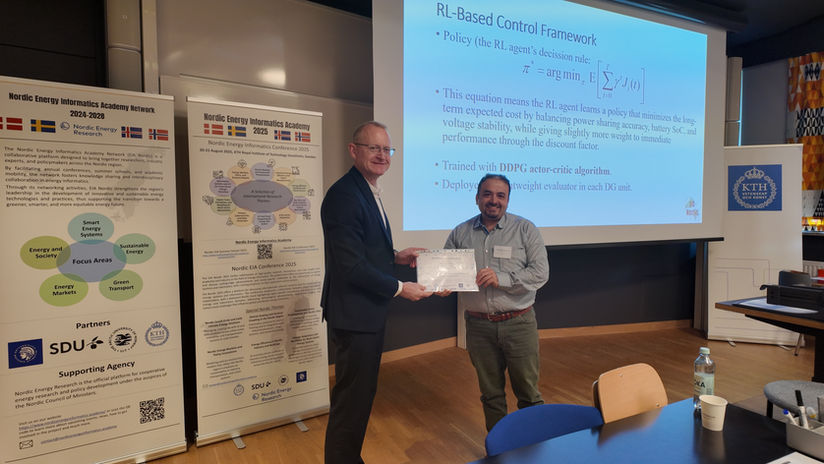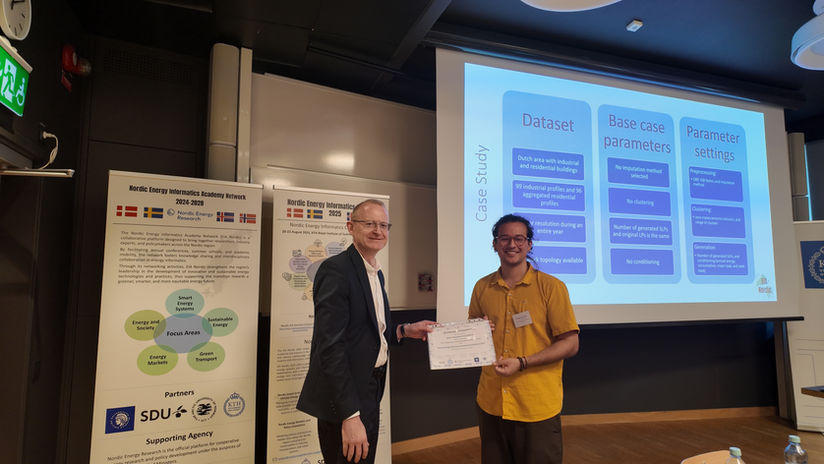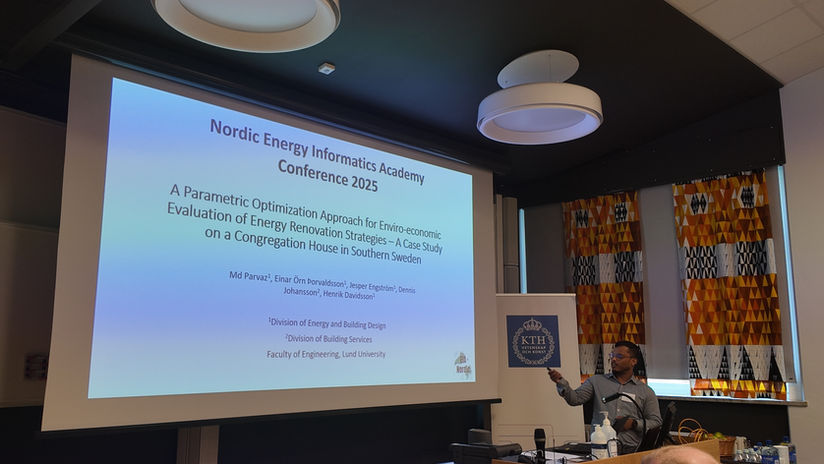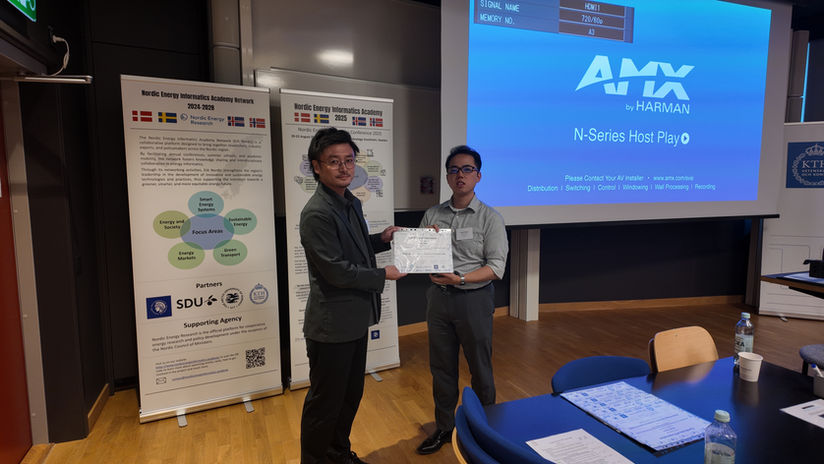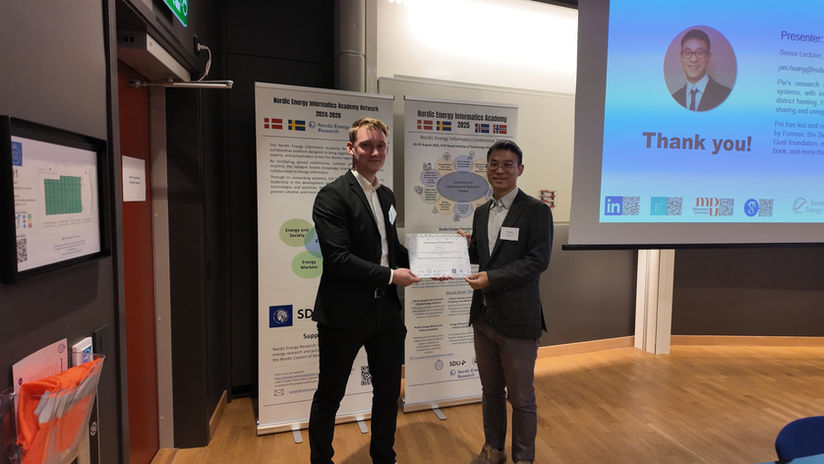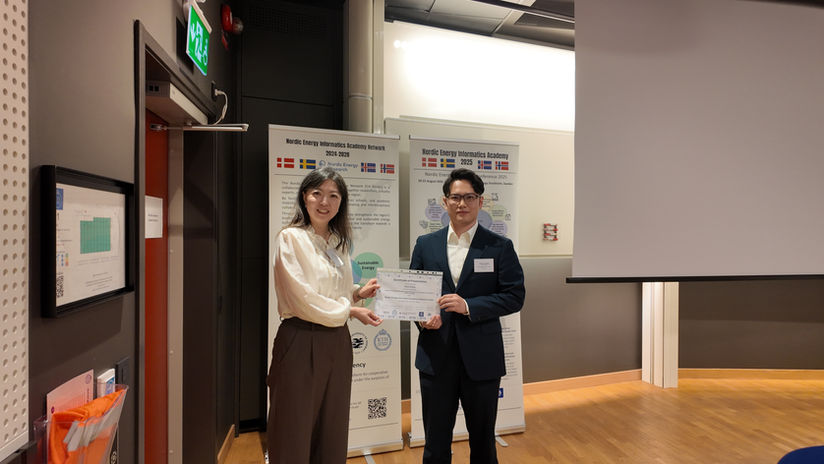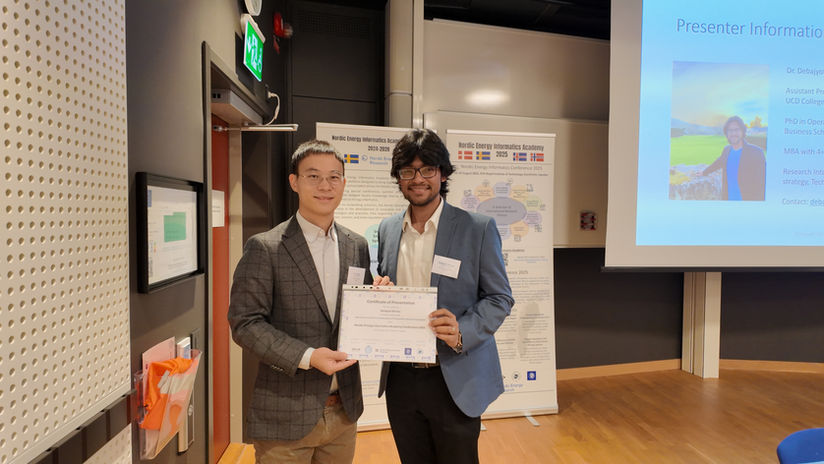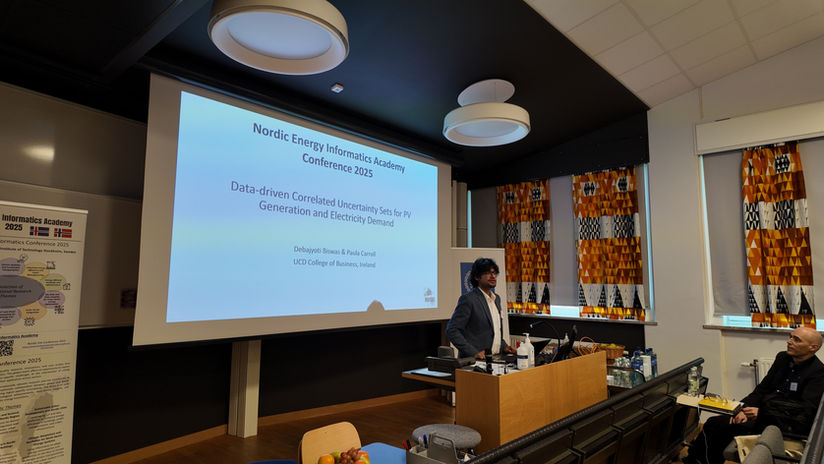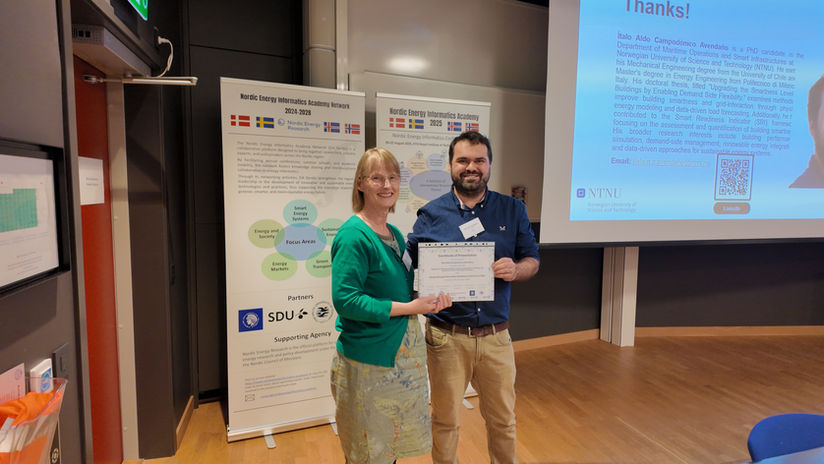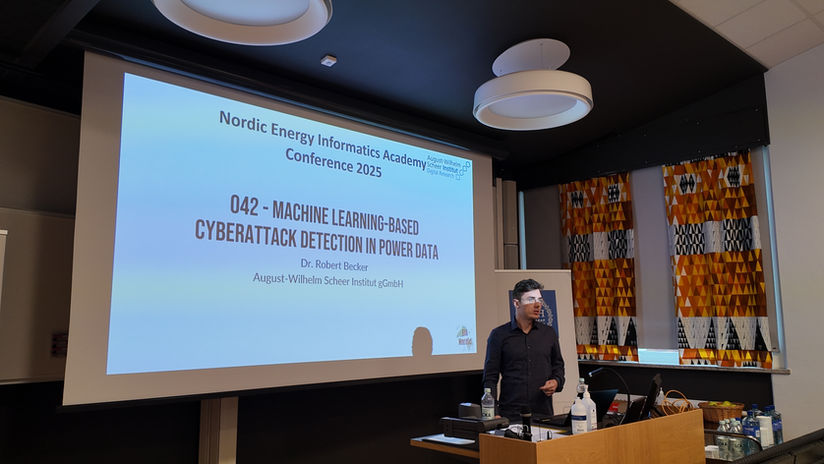
Nordic Energy Informatics Academy Conference 2025
20-22 August 2025, KTH Royal Institute of Technology, Stockholm, Sweden
The Nordic Energy Informatics Academy Conference 2025 (EIA Nordic 2025) invites submissions of high-quality research, innovations, and case studies from academia and industry in the field of energy informatics. This global event offers an opportunity to explore cutting-edge advancements and sector-specific challenges at the intersection of energy systems and informatics, with a strong emphasis on their application across sectors.
EIA Nordic 2025 offers a platform for discussing internationally relevant research and the intersection of energy systems and informatics. The conference emphasizes collaboration between global and Nordic stakeholders, with a dedicated Nordic track highlighting region-specific innovations. The focus is on both energy and informatics domains, addressing technological advancements, data-driven insights, and system-level challenges that influence global and Nordic energy transitions.
Fully Sponsored Participation
Thanks to sponsorship from Nordic Energy Research, participation in the conference is free of charge for all admitted attendees. The sponsorship also covers catering during the three-day event, including daily morning and afternoon tea, lunch, and the gala dinner on Day 2.
The EIA 2025 is organized in cooperation with the EIA Nordic Summer School on Smart Buildings 2025 (18-19 August 2025).
Conference Themes
EIA Nordic 2025 explores a wide range of topics that go beyond energy systems, with a focus on technical innovations, data-driven insights, policy frameworks, and business models that influence both energy production and consumption across multiple sectors. These themes include but are not limited to:
International Research Themes
-
Smart Grids and Distributed Energy Resources: Data-driven optimization for energy distribution networks and integrated grid systems.
-
District Heating and Cooling: Leveraging simulations and business models to optimize energy networks for buildings and urban environments.
-
Electric Mobility and Sustainable Transportation: AI and informatics solutions for integrating electric vehicles, public transportation, and sustainable mobility services into smart energy networks.
-
Industrial Energy Efficiency and Smart Manufacturing: Informatics approaches to improving energy efficiency in industrial operations and integrating renewable energy.
-
Energy-Efficient Buildings and Infrastructure: Data analytics, IoT, and digital twins for optimizing energy use in buildings, urban infrastructure, and smart cities.
-
Energy Markets, Policy, and Business Models: Using informatics to shape business models and regulatory frameworks in global energy markets.
-
Sectoral Coupling: Informatics-driven approaches to linking energy systems with industry, transportation, and buildings for holistic energy optimization.
-
Energy Economics and Finance: Data analytics and financial modeling for forecasting energy markets and driving investments in sustainable solutions.
-
Big Data and Data Analytics for Cross-Sector Energy Optimization: Managing large datasets to optimize energy usage in transportation, industry, and urban systems.
-
Artificial Intelligence (AI) for Sector Integration: AI for enhancing energy optimization across diverse sectors such as industry, transportation, and urban systems.
-
Internet of Things (IoT) and Cloud Computing for Energy and Sectors: Integrating IoT devices across sectors to enable seamless energy management and consumption forecasting.
-
Digital Twins, Simulation, and Modeling for Multi-Sector Optimization: Simulations to model and optimize energy use across sectors such as buildings, manufacturing, and transportation.
-
Privacy, Cybersecurity, and Data Protection: Ensuring the security of energy-related data across all sectors, from transportation to industry.
-
Information Systems and ICT for Cross-Sector Energy Transition: Developing robust ICT systems to manage the intersection of energy with transportation, industry, and other sectors.
Special Nordic Theme
The conference will include a dedicated Nordic track that focuses on the unique challenges and informatics-driven solutions in the Nordic region across multiple sectors. This theme will emphasize policy, technical innovations, and business models specific to the region’s industries and urban systems. Themes in this track include:
-
Nordic Smart Grids and Cold-Climate Energy Solutions: Managing smart grids with AI and data analytics across urban areas, industries, and transportation systems in cold climates.
-
District Heating and Sectoral Coupling in the Nordic Region: Informatics solutions for district heating and its integration with industrial processes, urban systems, and renewable energy.
-
Sustainable Urban Development and Nordic Cities: Leveraging IoT and data platforms to enhance energy efficiency in buildings, public transportation, and urban infrastructure.
-
Energy Efficiency in Nordic Industry and Buildings: AI and data-driven methods to improve energy performance in industrial and building sectors across the Nordic region.
-
Nordic Energy Markets and Policy Innovations: Modeling policies and business models that reflect the Nordic region’s emphasis on sustainability in industry, transportation, and urban systems.
-
Climate Adaptation and Resilience for Multi-Sector Energy Systems: Using informatics to adapt energy consumption and production in the face of climate challenges across transportation, industry, and urban sectors in the Nordic region.

Publications
The Accepted and presented papers* have been published in the Springer Lecture Notes in Computer Science (LNCS) proceedings volume.
LNCS volumes are indexed in the Conference Proceedings Citation Index (CPCI), part of Web of Science; Scopus; EI Engineering Index; Google Scholar; DBLP; etc.
The conference proceedings are available online:
-
📘 Conference Proceedings, Part I: Online access here / Download here
-
📗 Conference Proceedings, Part II: Online access here / Download here

Photo Gallery
Nordic Energy Informatics Academy Conference 2025
Opening Session
Keynote Speeches
Paper Section: Energy Forecasting and Intelligent Control Systems
Paper Section: District Heating, Thermal Systems, and Retrofit Strategies
Paper Section: Building Simulation, Urban Energy, and Environmental Sensing
Paper Section: Industrial Process Efficiency and Biomass Utilization
Paper Section: Energy Informatics for Electric Vehicles and Mobility Systems
Paper Section: Multi-Agent Systems and Local Market Coordination
Paper Section: Policy, Metrics, and Infrastructure Performance
Paper Section: Smart Building Systems and Semantic Data Integration
Paper Section: Prosumer Optimization and Energy Storage in Local Energy Communities
Paper Section: Grid-Oriented AI, Simulation, and Resilience
Paper Section: Non-Intrusive Load Monitoring and Data Competitions
Closing Session
Site Visit
Keynote Speakers and Presentations
Overcoming barriers to unlock potential data exchange from building to energy domain
Arianna Fonsati
KTH Royal Institute of Technology, Sweden
Arianna Fonsati is a PostDoc in the Sustainable Buildings division at the Royal Institute of Technology in Stockholm. She has worked in the industry as an architect and received a PhD in Urban and Regional Development from the Polytechnic University of Turin. Her research interests include digitalization in the construction industry, specifically analyzing and assessing different techniques to promote efficient processes for data exchange and management throughout the lifecycle of buildings. she is co-leader of sub-task 2 of EIA EBC Annex 91 on "openBIM for Energy Efficient Buildings" and has been involved in research projects at both national and international levels.
Reducing the energy performance gap by verifying functions and energy use in apartment buildings
Per Kempe
Tekn. Dr., RISE Research Institutes of Sweden, Sweden
Per Kempe is a Senior Researcher in Building Services Engineering at RISE – Department of Building and Real Estate, where he is responsible for BeBo’s Functional Operation activities. He holds a background in Building Engineering Services from KTH Royal Institute of Technology, where he specialised in installation system performance, combining measurement data with theoretical calculations. During his time at KTH, he managed the installation laboratory and contributed to IEA-EBC Annexes 17, 25, and 34, focusing on fault detection and diagnosis.
With over 25 years of industry experience, Per has held technical leadership roles at Skanska, including installation manager for Nordic apartment building projects and technical manager at Skanska Installation. His expertise lies in performance diagnostics and optimisation of building systems using operational data. He has led several R&D projects on energy monitoring, indoor climate, and reducing performance gaps. Per is an active member of Swedish standards committees SIS TK189 and TK170 and Svensk Ventilation’s product steering group.
Integrating Electric Mobility and Smart Buildings: Educational Perspectives on Sustainable Urban Development
Chiara Bordin
Associate Professor, The Arctic University of Norway, Tromsø, Norway
Chiara Bordin is an associate professor with a focus on teaching and research within the energy informatics domain. Her main research interests are related to mathematical optimization in the context of computer science applied to smart energy and power systems. She holds a M.Sc. and a B.Sc. in Industrial Engineering from the University of Bologna (Italy). She obtained her PhD from the same university in control system engineering and operational research, with a thesis focused on mathematical optimization applied to thermal and electrical energy systems. Afterward, she worked as a research associate at the University of Durham (UK) in collaboration with the Durham Energy Institute and the Engineering Department of Cambridge University. She then worked as a postdoctoral fellow at NTNU, the Norwegian University of Science and Technology (Norway). She has been a research scientist at SINTEF Energy (Norway), the largest research centre in Scandinavia. Throughout this path, Chiara has been involved in a wide variety of interdisciplinary projects within energy and power systems, where she further developed three main research fields of specialization: predictive analytics, prescriptive analytics, and pedagogy.
Neighbors with Benefits: Modelling the Multi-Criteria Challenges of Peer Energy
Rúnar Unnþórsson
Professor, University of Iceland, Iceland
Dr. Rúnar Unnþórsson has over 24 years of experience in energy-related projects. His work spans thermoelectrics, geothermal power plant efficiency and maintenance analysis. He has also optimized maritime propulsion systems by retrofitting boats with advanced propellers, significantly reducing fuel consumption. Additionally, Dr. Unnþórsson has pioneered the repurposing of old EV batteries, integrating them with diesel generators to reduce reliance on fossil fuels and enhance energy sustainability. Collaborating with industrial partners, public bodies, and government agencies, Dr. Unnþórsson ensures his work has practical applications and real-world impact. He holds a Ph.D. in Mechanical Engineering from the University of Iceland. His extensive background in energy solutions underscores his commitment to advancing technology and promoting sustainability across various industries.
Conference Program Chairs
General Chairs
Ivo Martinac, KTH Royal Institute of Technology, Sweden
Bo Nørregaard Jørgensen, University of Southern Denmark, Denmark
Program Chairs
Zheng Grace Ma, University of Southern Denmark, Denmark
Rúnar Unnþórsson, University of Iceland, Iceland
Chiara Bordin, Arctic University of Norway, Norway
Publication Chair
Zheng Grace Ma, University of Southern Denmark, Denmark
Operations Officer
Signe Rude Madsen, University of Southern Denmark, Denmark
Program Committee
Full name | Affiliation | Country |
|---|---|---|
Abbas Fotouhi | Cranfield University | UK |
Di Wu | Norwegian University of Science and Technology | Norway |
Zeeshan Afzal | Linköping University | Sweden |
Agus Hasan | Norwegian University of Science and Technology | Norway |
Pei Huang | Dalarna University | Sweden |
Yasunori Akashi | The University of Tokyo | Japan |
Sebastian Büttrich | IT University of Copenhagen | Denmark |
Umit Cali | University of York | United Kingdom |
Paula Carroll | University College Dublin (UCD) | Ireland |
Taro Mori | Hokkaido University | Japan |
Etienne Saloux | Natural Resources Canada | Canada |
Ólafur Pétur Pálsson | University of Iceland | Iceland |
Qian Wang | KTH Royal Institute of Technology | Sweden |
Kai Heussen | Technical University of Denmark | Denmark |
Abdulsalam Yassine | Lakehead University | Canada |
Ahmed Yousif Mohamed Idries | Norwegian University of Science and Technology (NTNU) | Norway |
Aikaterini Chatzivasileiadi | Cardiff University | UK |
Alexander Kies | Aarhus University | Denmark |
Alireza Afshari | Aalborg University | Denmark |
Amjad Anvari-Moghaddam | Aalborg University | Denmark |
Aoife M. Foley | The University of Manchester | UK |
Arianna Fonsati | KTH Royal Institute of Technology | Sweden |
Bjørn Austbø | Norwegian University of Science and Technology | Norway |
Carlos Fernandez | Robert Gordon University | UK |
Cathryn Peoples | Ulster University | UK |
Eduard Petlenkov | Tallinn University of Technology | Estonia |
Hamid Reza Shaker | University of Southern Denmark | Denmark |
Hassam ur Rehman | VTT Technical Research Centre of Finland | Finland |
Hicham Johra | SINTEF Community | Norway |
Hossam Gaber | Ontario Tech University | Canada |
Hung Cao | University of New Brunswick | Canada |
Igor Sartori | SINTEF, Community | Norway |
Jarek Kurnitski | Tallinn University of Technology | Estonia |
Jianguo Ding | Blekinge Institute of Technology | Sweden |
Joy Dalmacio Billanes | University of Southern Denmark | Denmark |
Joyjit Chatterjee | University of Hull | UK |
Juri Belikov | Tallinn University of Technology | Estonia |
Katja Sirviö | VTT Technical Research Centre of Finland Ltd | Finland |
Kristoffer Christensen | University of Southern Denmark | Denmark |
Kun Zhang | École de technologie supérieure, Université du Québec | Canada |
Laurent Georges | Norwegian University of Science and Technology | Norway |
Linas Martišauskas | Lithuanian Energy Institute | Lithuania |
Louis Gosselin | Université Laval | Canada |
Magnus Værbak | University of Southern Denmark | Denmark |
Majid Ali | Aalborg University | Denmark |
Mohamed Emad Farrag | Glasgow Caledonian University | UK |
Najmeh Bazmohammadi | Aalborg University | Denmark |
Ravi Pandit | Cranfield University | UK |
Risto Kosonen | Aalto University | Finland |
Saleh Abdel-Afou Alaliyat | Norwegian University of Science and Technology | Norway |
Vahid Nik | Lund University | Sweden |
Weiqi Hua | University of Birmingham | UK |
Yushuai Li | Aalborg University | Denmark |
Niklas Lavesson | Blekinge Institute of Technology (BTH) | Sweden |
Touraj Ashrafian | Northumbria University | UK |
Daniel Donaldson | University of Birmingham | UK |
Stefán Thor Smith | University of Reading | UK |
Manuel Llorca | Copenhagen Business School | Denmark |
Ivan Korolija | University College London | UK |
Hans-Peter Schwefel | Aalborg University | Denmark |
Himanshu Nagpal | EURAC Research | Italy |
Seyed Shahabaldin Tohidi | Technical University of Denmark (DTU) | Denmark |
Mahshid Javidsharifi | Aalborg University | Denmark |

Email us if you have any questions regarding the conference
-
Please make your email title start with "EIA Nordic 2025-Related matter"
-
Email: contact@nordicenergyinformatics.academy














